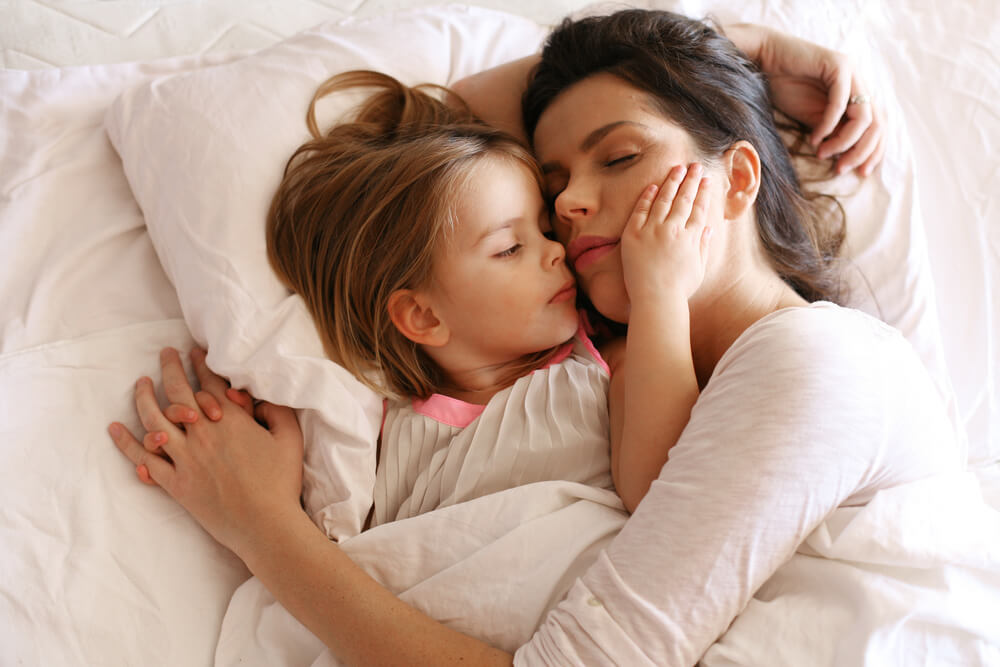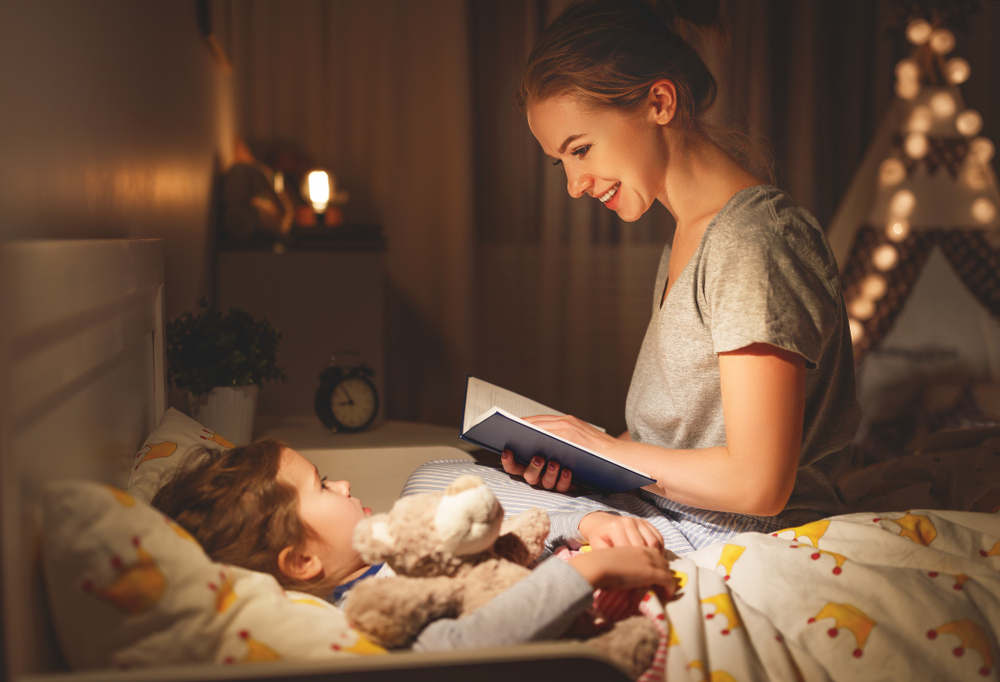Separately or Together: How Do Parents and Their Child Need to Sleep?

As soon as a newborn joins the family, mom and dad immediately ask themselves the question of where is it better for the baby to sleep—next to their parents or in their own crib? And if the child sleeps with their mother, at what age should they be taught to sleep separately?
Today, we will try to answer all of these questions and understand the benefits and harms of joint and separate sleep, as well as talk about how to get the child to stop co-sleeping with their parents.
Contents:
- Advantages and Disadvantages of Co-sleeping
- If a Child is Co-sleeping With Their Parents
- How to Stop Co-sleeping With Your Child?
- What to Do If the Child Is Afraid to Sleep On Their Own?
- Co-sleeping Safety Techniques
Advantages and Disadvantages of Co-sleeping

Prostock-studio/Shutterstock.com
Let’s firstly talk about the advantages and disadvantages of co-sleeping.
Advantages:
- The main advantage of co-sleeping with the parents is the psychological comfort of the baby, leading to a stabilization of their psycho-emotional state.
It is especially important for newborn child, as they need to adapt to their new living conditions. - Ease of feeding and caring for the baby
When the baby sleeps next to the mother, she does not need to be on duty by the crib throughout the night to calm the baby down, feed them or change their diaper. - Reducing the child’s anxiety and strengthening the mother-baby bond
After childbirth, many mothers experience great anxiety about the condition of their baby. They constantly check whether they are breathing, whether they have a fever and how they feel, in general. If the child sleeps next to the mother, she feels much calmer. In addition, co-sleeping in the first months of life will help strengthen the bond with the newborn.
Here are the disadvantages of co-sleeping:
- High risk of injury to the child during sleep, the danger of overheating or suffocation.
- Difficulty having the baby get used to sleeping in their crib or their room.
- Violation of an intimate relationship between the father and the mother, which can lead to family conflicts.
- Sleep problems in the child and/or parents, due to waking up frequently.
As for separate sleep, the main argument “for” here, is the ability of the mother to have a good rest and replenish her energy for the day. On the other hand, if we talk about the disadvantages, the difficulties of caring for and feeding a newborn will come to the fore, if the parents decide to immediately put the baby in their crib or their room.
A well-known child psychologist Lidia Hearst advises parents not to be so categorical in choosing joint or separate sleep for the child and rather to pay more attention to their behavior. If the baby is next to the parents and they begin kicking in their sleep, constantly crawling to the side, or having trouble falling asleep, then it’s time to teach them to sleep separately.
If a Child is Co-sleeping With Their Parents

Prostock-studio/Shutterstock.com
The Opinion of Psychologists
Child psychologists say that for a newborn child, the connection with their intrauterine experience is of great importance. An important role is played by bodily sensations: the smell of the mother, her warmth and her touch. That is why it is so important for a child to be with their mother as often as possible, in the first months of their life, including at night.
As the baby gets older, other matters become essential for them. For instance, the emotions that they can get from their loved ones, their words and gestures. The child’s personality begins to emerge and they start establishing themselves and learning about the world around them.
If at this stage the parents do not give the baby the opportunity to expand their boundaries independently, including falling asleep in their own bed, their mental development will begin to slow down.
Until What Age Can the Child Be Co-sleeping With Their Mother?
In our society, there are quite a lot of cases when a child continues to sleep with their mother at preschool and even school age. However, if we base ourselves on the opinion of children’s pediatricians, the best time for getting a child used to fall asleep in their own bed will be the age of 6-8 months.
At this age, the baby can already sleep peacefully through the night without waking up frequently and without the risk of suffocation when turning over.
It is necessary to extend the time of the child co-sleeping with their parents for the following reasons:
- the baby was born prematurely or with low weight at birth;
- the child has frequent colds;
- the mother suffers from unstable lactation;
- the child does not sleep well alone; they wake up at night and scream.
In Which Situations Are There Contraindications for Co-sleeping?

Prostock-studio/Shutterstock.com
There are some situations when co-sleeping with a child is strongly not recommended:
- Parents consume alcohol, drugs or sleeping pills.
- There is a risk of not waking up when needed and harming the baby. This also applies to cases when the mother is very tired.
- The father or the mother are suffering from obesity.
- Parents have a strong fear of injuring the baby during sleep.
- The mother decides to sleep with the child because of a conflict with her husband.
- Mom or dad are sick.
How to Stop Co-sleeping With Your Child?

Prostock-studio/Shutterstock.com
The child can be taught to sleep separately from their parents at any age. Nevertheless, the longer the child so-sleeps in their parent’s bed, the more difficult this process will be.
It is important for moms and dads to understand that recommendations for teaching a child to fall asleep in their own bed or room will vary depending on the age.
Before the age of 1 year old:
- At this age, the child really needs to have a bond with their mother. Therefore, it would be better if their crib is pushed close to the parent’s bed.
- Try to put your baby to bed at about the same time every day.
- Develop your own bedtime ritual for the child. For example, it could be bathing—lullaby—sleep.
At the age of 1–2 years old:
- At this age, you can already start teaching your child to fall asleep in their own room, separately from their parents.
- If the baby has a strong fear of the dark, it would be a good idea to purchase a night light with subdued light for their room. It will also be useful to choose a soft toy, that they will put down every night and fall asleep with it, together with your son or daughter.
- Do not rush to send the child to your room for the night. Hug them, lie down with them and read them a fairy tale.
At the age of 3 and above:
- Three-year-olds begin to show their own independence and strive to become separate from adults. However, before moving a son or daughter to their own room, the child must be prepared for this.
- Choose a suitable bed, bed linen and toys that your child will sleep with, together with your child. Make sure to ask their opinion about the upcoming changes in their life.
- At first, the child may be coming to their parents in the middle of the night. Do not scold them and do not send them back immediately. The child simply needs to feel that you are next to them, that you love them and that you can protect them from any dangers.
- Be sure to praise your child in front of friends and relatives. Say that they are now grown-ups because they have their own bed or room.
Take care of the safety of the child, even when you are not near them! Put a GPS watch on your baby and always know where they are and what is happening around them. When buying a watch at the official online store, you will get a license for the best parenting app Findmykids for free!
What to Do If the Child Is Afraid to Sleep On Their Own?

Prostock-studio/Shutterstock.com
It often happens that a child has just begun to get used to sleeping in their own bed, however, they suddenly start to be afraid of being alone, and they cry and call their parents.
What can’t the mother and the father do in this situation:
- Don’t ignore your baby’s feelings. The child may experience severe stress from being separated from their mother. Give them time to get used to the new circumstances in a gradual fashion. Some children take a few days to get used to sleeping separately, while others may take several months.
- Learn to distinguish the fears and worries of the child from the usual whims. Many children try to get what they want from their parents by screaming and crying, and one of such wishes could be to co-sleep with their mom and dad. You cannot succumb to the manipulation of the child, or otherwise, you will have to start over the entire process of getting them used to sleeping separately.
- Pay attention to the comfort of the child’s bed, as well as the room temperature. They may perhaps be simply uncomfortable sleeping in tight clothes and in a room with stuffy air.
- If the baby cannot get used to their bed for a long time and they are constantly crying and screaming, they must be shown to a pediatrician, a neurologist or a psychologist, in order to find the cause of their fear and anxiety.
- The child will fall asleep faster if they have sufficient motor activity and a variety of experiences during the day.
Read more on an interview with a psychologist on How to help a child cope with their fears?
Co-sleeping Safety Techniques

Prostock-studio/Shutterstock.com
When choosing to co-sleep with your child, do not forget about some safety rules.
- The mattress on the bed should be firm and even so that the child does not roll off it accidentally. A good option is to use a side crib that is leveled with your bed.
- Do not use heavy blankets and pillows to avoid overheating the baby.
- When choosing sleepwear, avoid shirts or pajamas with ties, ribbons, or buttons. Give preference to clothing made from natural fabrics.
- Avoid using creams, perfumes, and toothpaste with a strong smell.
- The bed linen should be clean and fresh. Use hypoallergenic detergents without fragrances and dyes for washing. Additionally, it would be better if the baby sleeps on a special absorbing pad.
- Do not put the child on the edge of the bed. It is better to place them between you and the wall, whilst closing the gap with a special limiter or a folded blanket.
- Maintain a comfortable temperature of 20–21°C, as well as humidity conditions of 50–60%.
It’s up to you to choose whether co-sleeping is needed for your child. The main goal is for the baby and their parents to get enough sleep and rest at night.
The picture on the front page: BlLiderina/Shutterstock.com
Проверьте электронный ящик



















